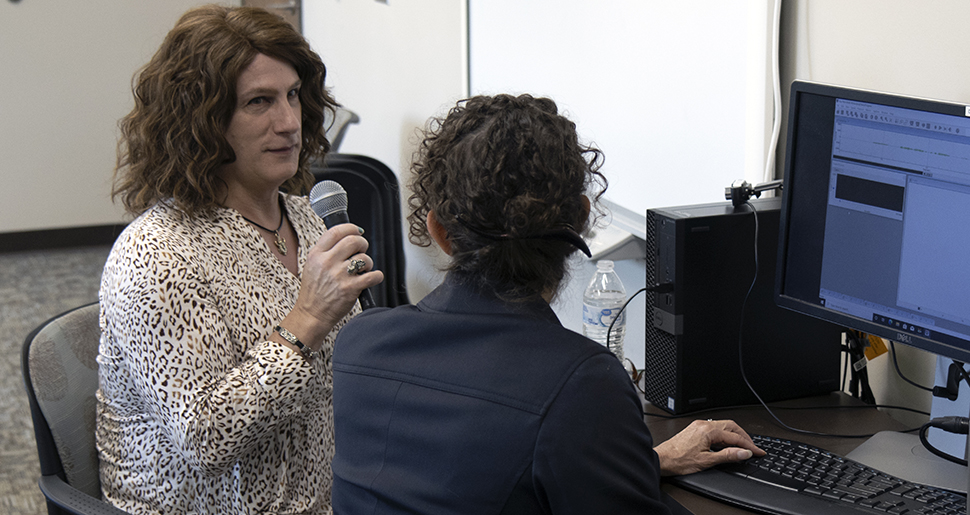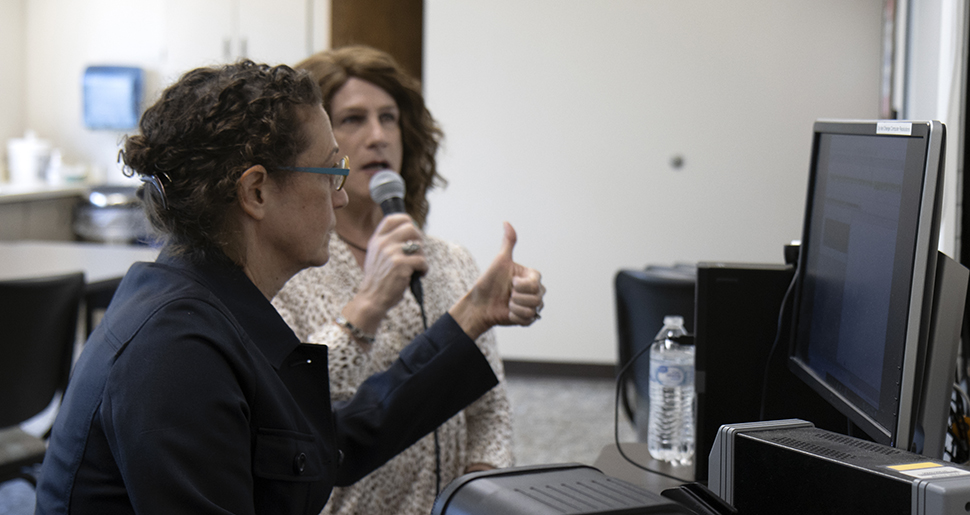Sena Crutchley didn’t set out to become a specialist in gender affirming voice work. When she joined UNC Greensboro’s Communication Sciences and Disorders Department (CSD) in 2007, the University already had an established program housed within the Speech and Hearing Center.
Crutchley left the University in 2012, and when she returned six years later, she revitalized the program that had faded in her absence as people left or retired, and helped rebrand it as the Gender Affirming Voice and Communication Program. The program helps clients find their authentic voice that is congruent with their gender identity.
For a transgender woman, this would be a voice others would perceive as feminine. A transgender man may want their gender attribution by others to be male. For someone who’s nonbinary, they may want others unsure of the gender assigned at birth. Nonbinary clients who may lean more feminine or masculine could also want a voice perceived as gender neutral but with some stereotypical feminine or masculine qualities.
The Gender Affirming Voice and Communication Program is available to any interested client, including UNCG students, staff, faculty, or members of the public. Crutchley, a speech-language pathology associate professor and clinical educator at UNCG, heads the program and is assisted by speech language pathology graduate students working in the clinic.
(Clients) are typically scheduled one time a week for one-hour sessions. Gender diverse clients, like clients in the Center who have aphasia or who stutter, might be seen more often depending on their need and clinician availability.
Clients are assessed prior to beginning services. Assessment includes completion of a case history form, an interview, and a voice evaluation to ensure their voice is healthy. Crutchley and the students who work with the Gender Affirming Voice and Communication Program measure average speaking pitch and range, listen to vocal qualities, and give the clients a rating scale questionnaire checklist to determine their needs. They also ask the clients what they would like to improve.
We ask if they want to work on any nonverbal communication skills, and if there is a communications style or celebrity voice they’re going for, so we have some idea. We also do a hearing screening.
After staff gathers some information from the clients, they get to work.
“We write goals based on what the client wants, and authenticity is very important,” Crutchley said. “We focus on voice and resonance. We develop reasonable goals based on where we’re starting. We don’t want to cause vocal damage by pushing the client too far too fast. We teach breath support and exercises to increase flexibility and strengthen the muscles of the voice box. We teach to gradually change pitch, and to shape the mouth in a way that will aid in the client achieving their goal of being perceived as more masculine, feminine or gender neutral.”

One of the Gender Affirming Voice and Communication Program’s current clients is Victoria “Vicki” Knight. Born Victor Knight, she was married for more than 20 years before she admitted that she was not being true to herself. In 2015 Knight, then still Victor, told her wife she was transgender.
“I had suppressed for many years,” Knight said. “I grew up in a family of seven with only one sister. I got into a model of suppressing and overcompensating.” After being truthful with her wife and splitting up with her, Knight moved to Greensboro and began exploring her new identity with other transgender friends. As Knight began to discover herself and became more comfortable with who she really was, she learned of UNCG’s Gender Affirming Voice and Communication Program from a Facebook group.
Knight was part of a two-week intensive program that began in early July at UNCG, and she credits the work she did with the program with improving her voice.
“They evaluated my voice and recorded it. We talked about my goals and made sure my vocal goals were in-line with my life goals. We did conversation exercises, games to control my voice and I got feedback,” she said. “I had homework, to do vocal exercises, with emphasis on breath support.”
Initially, Knight said she didn’t feel her voice sounded authentic to her, so she watched videos of a few well-known figures, and worked on structuring the way she talked to make it more fluid.
It was not a natural way to talk, I’m used to speaking in more of a monotone. I didn’t want my voice to be phony. They’ve done a great job (helping me) here. The environment they’ve created was very accepting and positive and encouraging. It’s so cool to have a program like that right here in Greensboro.
Clients are typically seen for one-hour sessions, either in person or via Zoom. UNCG students, staff, and faculty are encouraged to reach out to the Speech and Hearing Center to learn how they may be able to receive gender affirming voice and communication services.
This semester there are six graduate students and one undergrad who are working in the clinic under Crutchley’s supervision. There are three clients with two others on the waitlist. Crutchley has previously referred work to another agency in Greensboro when the waitlist has gotten too long, citing the need to help people.
“This is rewarding work and there is such a need,” Crutchley said. “I’ve had clients say, ‘this work saved my life,’ because there is a high suicide rate in this population. I’m glad more people feel comfortable expressing who they are.”
To inquire about becoming a client of the Gender Affirming Voice and Communication Program, call 336-256-2003.
Story by Sarah Newell, School of Health and Human Sciences
